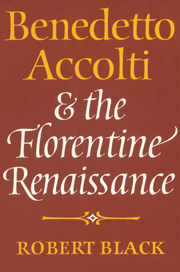Book contents
- Frontmatter
- Contents
- Dedication
- Preface
- Abbreviations
- 1 Arezzo in the early Renaissance
- 2 The Accolti family
- 3 Benedetto Accolti's early life and works
- 4 Accolti in Florence and Arezzo in the 1440s and early 1450s
- 5 Accolti's election as chancellor of Florence
- 6 The Florentine chancellorship
- 7 The Florentine chancery under Accolti
- 8 Accolti's Dialogus
- 9 Accolti's history of the first crusade and the Turkish menace
- 10 Accolti and Renaissance historiography
- Epilogue
- Appendix I Letters of Benedetto Accolti
- Appendix II Accolti's work as a palace official during his chancellorship
- Appendix III Pratica concerned with increasing Accolti's salary as chancellor
- Appendix IV Accolti and the incident of Ponzano, July–August 1463
- Select bibliography
- Index
4 - Accolti in Florence and Arezzo in the 1440s and early 1450s
Published online by Cambridge University Press: 12 October 2009
- Frontmatter
- Contents
- Dedication
- Preface
- Abbreviations
- 1 Arezzo in the early Renaissance
- 2 The Accolti family
- 3 Benedetto Accolti's early life and works
- 4 Accolti in Florence and Arezzo in the 1440s and early 1450s
- 5 Accolti's election as chancellor of Florence
- 6 The Florentine chancellorship
- 7 The Florentine chancery under Accolti
- 8 Accolti's Dialogus
- 9 Accolti's history of the first crusade and the Turkish menace
- 10 Accolti and Renaissance historiography
- Epilogue
- Appendix I Letters of Benedetto Accolti
- Appendix II Accolti's work as a palace official during his chancellorship
- Appendix III Pratica concerned with increasing Accolti's salary as chancellor
- Appendix IV Accolti and the incident of Ponzano, July–August 1463
- Select bibliography
- Index
Summary
The Certame Coronario of October 1441 with its inconclusive outcome was a discouraging experience for the competitors, and Benedetto Accolti was perhaps fortunate in having an intellectual life which extended beyond the now somewhat soured humanist circles of Florence. He had just become fully qualified to practise law and he now devoted all his efforts to establishing a legal practice in Florence. In the five or six years following 1441 Accolti appears to have laid his humanist studies to one side, his father Michele's death in 1441 having led him to concentrate on the serious business of building up a legal career to help to support his widowed mother and brothers and sisters. Michele Accolti had left an estate worth about 1600 florins; this would provide an annual income of perhaps just over 100 florins, which would be a useful supplement to a professional income but nothing like enough to maintain the Accolti family at the standard of living provided by Michele with his earnings as a lawyer. Moreover, Benedetto had two younger unmarried sisters, Tommasa and Nanna, whose dowries would eventually reduce substantially the capital inherited from his father. After his father's death in 1441 Accolti must have felt that he had little time for an unremunerative pastime such as the humanities.
Accolti's legal career advanced during the early 1440s, and after his unsuccessful attempt to move to Siena in 1440 he showed no more signs of wishing to leave Florence for a number of years. He taught civil law at the university throughout the 1440s, and his salary rose rapidly from the sixty florins that he had been receiving up to 1442.
- Type
- Chapter
- Information
- Benedetto Accolti and the Florentine Renaissance , pp. 59 - 84Publisher: Cambridge University PressPrint publication year: 1985



